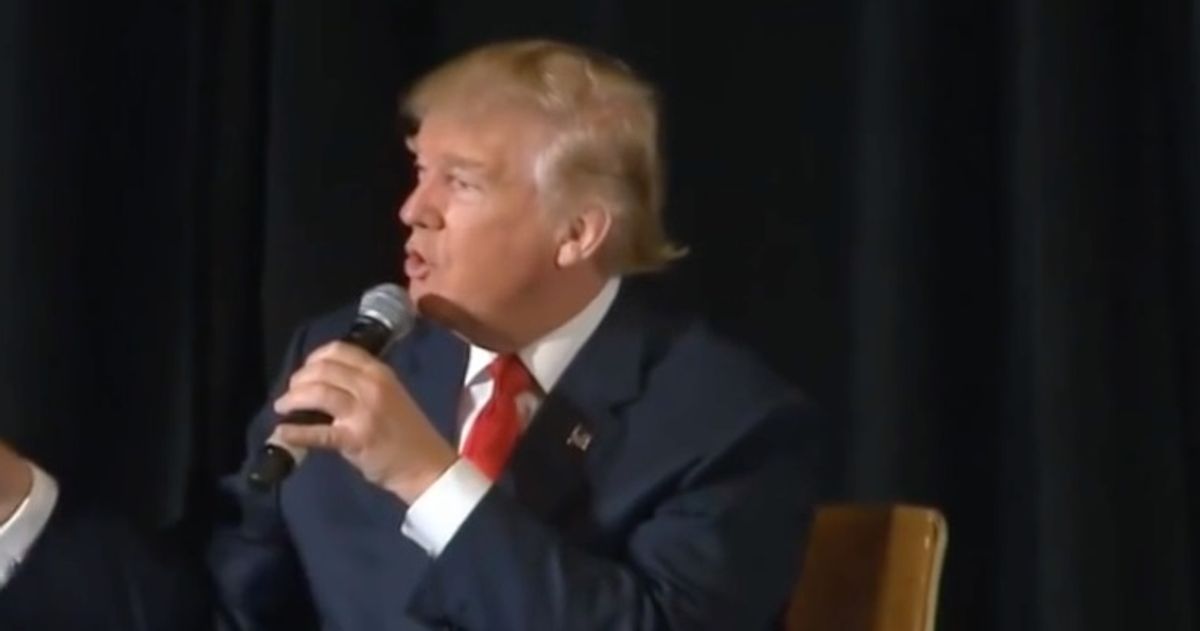After a Retired American Warriors town hall campaign event was held on 3 October 2016 in Herndon, Virginia, Republican presidential candidate Donald Trump was widely accused of insultingly asserting that veterans who suffer from Post-Traumatic Stress Disorder (PTSD) are weak.
Occupy Democrats was one of many political outlets claiming Trump had called veterans with PTSD weak and had insulted those who required mental health services after serving, and that the news media largely ignored hist comments:
In an exchange missed by most of the media, Trump insulted all of our veterans who have suffered psychological trauma during their overseas tours by saying that only weak soldiers suffer from PTSD, and that therefore our “strong veterans” don’t require psychological counseling when they return home.
The Washington Post also weighed in, framing Trump's comments as a "gaffe":
There will be plenty of quibbling in the hours ahead, but Donald Trump clearly just created a new batch of problems for himself with his comments [on 3 October 2016], in which he suggested that veterans dealing with mental health problems aren't "strong" and "can't handle it."
The media clearly hadn't "missed" the exchange, as numerous news outlets covered the controversy.
The claim about what Trump said was one bolstered largely by its backlash, but much of the audience hadn't read or watched video of the town hall event in its entirety to determine whether Trump had really described veterans with PTSD as "weak."
Former congressman and retired U.S. Army Lt. Colonel Allen West was present at the event and strongly disputed media accounts of the exchange, which began with a question from a Retired American Warriors town hall attendee:
Good morning Mr. Trump. As you mentioned there is a tragic suicide epidemic among our veterans, among our military and their families. While the military and the V.A. are working on the problem, their efforts continue to fall short. There are a number of faith-based programs outside the DOD and the V.A., that are continuing to be successful in stopping suicide and divorce rates.
Spiritual fitness works on these types of problems. The government is not taking advantage of these programs and services. So my question for you is, when you become president, will you support and fund a more holistic approach to solve the problems and issues of veteran suicide, PTSD, TBI and other related military mental and behavioral health issues and will you take steps to restore the historic role of our Chaplains and the importance of spiritual fitness and spiritual resiliency programs?
Trump's complete response focused largely on committing to an increase in veterans' services, not on deriding disabled veterans. He indeed flattered "folks in this room" for being "strong," but he also expressed empathy at length for those military personnel who had experienced "horror stories" which "nobody would believe":
Yes I would. Look we need that so badly and when you ... when you talk about the mental health problems, when people come back from war and combat and they see things that maybe a lot of the folks in this room have seen many times over and you’re strong and you can handle it. But a lot of people can’t handle it. And they see horror stories. They see events that you couldn’t see in a movie, nobody would believe it.
Now we need a mental health help and medical. And it’s one of the things that I think is least addressed and is one of the things that — like your question — one of the things that I hear the most about when I go around and talk to the veterans. So we’re going to have a very, very robust, level of performance having to do with mental health. We are losing so many great people that can be taken care of if they have proper care.
You know when you hear the 22 suicides a day it’s a big part of your question. But when you hear the 22 suicides a day that should never be. That should never be. So we’re going to be addressing that very strongly and the whole mental health issue is going to be a very important issue when I take over and the V.A. is going to be fixed in so many ways but that’s going to be one of the ways we’re going to help.
And that’s in many respects going to be the number one thing we have to do. Because I think it’s really been left behind. OK? Thank you very much.
Trump's remarks (at approximately the 0:55 minute mark) were not derisive: he maintained that veterans' mental health care was one of the issues he felt was "least addressed," and he held that he commonly received similar questions when meeting with service members.
Most critical reporting on the event elided Trump's key contextual assertion that "we're losing so many great people that can be taken care of if they have proper care," So while it's true Trump described present veterans as "strong" during the town hall event, he didn't also describe veterans dealing with mental health issues as weak or unfit.

